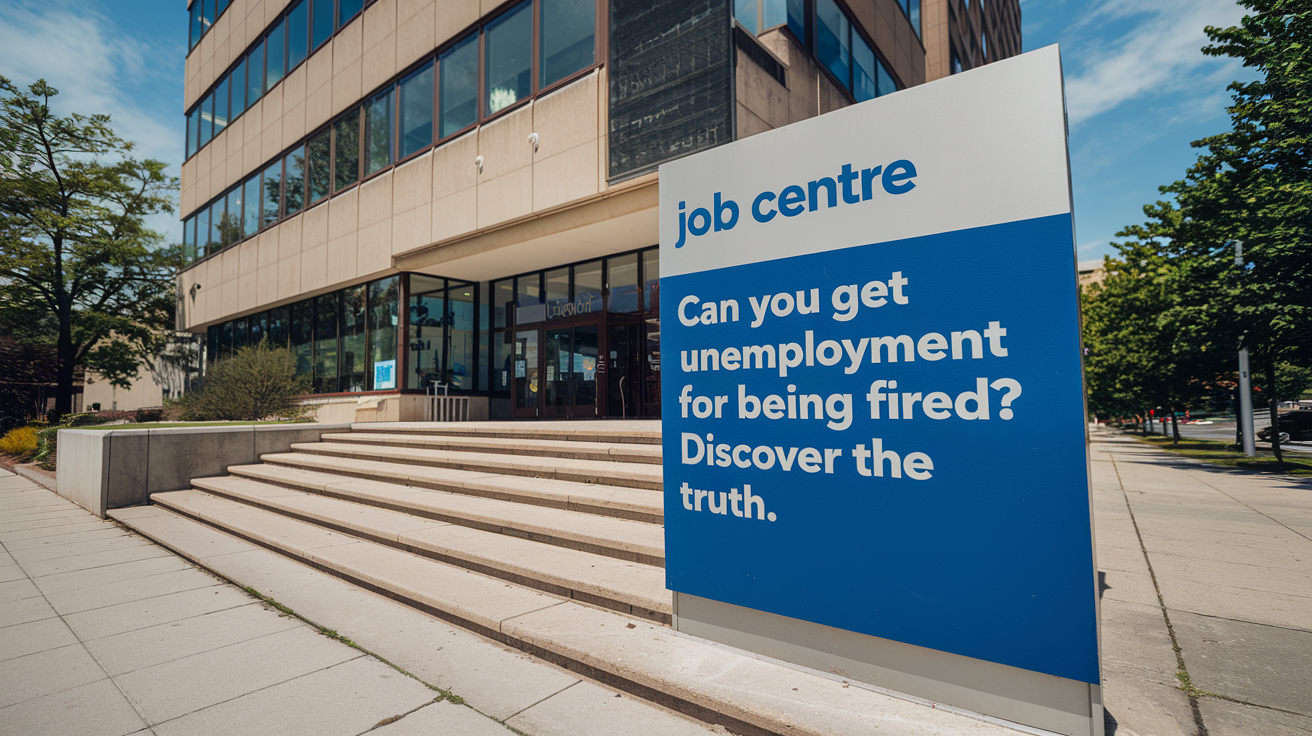Table of Contents
Losing a job can be a stressful experience, especially when it happens unexpectedly. If you’ve been fired, one of the first questions that might cross your mind is, “Can you get unemployment for being fired?” This is a valid concern, as unemployment benefits can provide a much-needed financial cushion while you search for your next opportunity. In this article, we will explore whether being fired disqualifies you from unemployment benefits and what steps you can take to secure them.
Can You Get Unemployment for Being Fired? What Are Unemployment Benefits?

Can You Get Unemployment for Being Fired? Unemployment benefits are payments made by the government to individuals who have lost their jobs through no fault of their own. These benefits are designed to provide temporary financial assistance to help cover basic living expenses while you look for new employment. But when it comes to being fired, the rules can get a bit tricky.
Can You Get Unemployment for Being Fired?
Can You Get Unemployment for Being Fired? The answer to whether you can get unemployment for being fired is not a simple yes or no. It largely depends on the reason for your termination. Understanding the circumstances surrounding your firing is critical to determining your eligibility.
Reasons You Might Still Qualify
- Layoffs and No Fault of Your Own: If you were let go due to company downsizing, budget cuts, or any reason that wasn’t your fault, you’re likely eligible for unemployment benefits. In such cases, being fired doesn’t disqualify you because the termination wasn’t due to your performance or behavior.
- Performance Issues: If you were fired because you didn’t meet specific performance standards, you might still qualify for unemployment benefits. Many states recognize that not every job is a perfect fit, and being let go for performance reasons doesn’t necessarily mean you’re ineligible.
- Misunderstandings or Unjust Firings: Sometimes, employees are fired due to misunderstandings or wrongful accusations. If you believe your firing was unjust, you should still apply for unemployment. The unemployment office will investigate the circumstances, and if they find that your firing was not justified, you may be granted benefits.
Reasons You Might Not Qualify
- Misconduct: Can You Get Unemployment for Being Fired? If you were fired for misconduct, such as violating company policies, theft, or other serious offenses, you might not be eligible for unemployment benefits. Misconduct typically disqualifies you because it indicates that your actions directly led to your firing.
- Voluntary Resignation: While not technically being fired, it’s worth noting that if you quit your job voluntarily without good cause, you generally won’t qualify for unemployment benefits. The same applies if you were fired after giving notice to quit.
- Legal Violations: If your firing were due to illegal activities or severe violations of company rules, unemployment benefits would likely be off the table. States typically view these situations as clear disqualifiers.
How to Apply for Unemployment After Being Fired

Can You Get Unemployment for Being Fired? If you’ve been fired and believe you qualify for unemployment benefits, the next step is to apply. Here’s a simple guide on how to navigate the process:
Step 1: Gather Your Information
Can You Get Unemployment for Being Fired? Make sure you have all the information you need on hand before beginning your application. This includes:
- Your Social Security number
- Details about your last employer (name, address, and contact information)
- Dates of your employment
- Reasons for your termination
Having this information ready will make the application process smoother and faster.
Step 2: File Your Claim
Can You Get Unemployment for Being Fired? You can file your unemployment claim online, by phone, or in person at your local unemployment office. During the application, be honest about the reason for your termination. The unemployment office will contact your former employer to verify the details, so accuracy is crucial.
Step 3: Wait for a Decision
After you file your claim, the unemployment office will review your case. Please be patient, as this procedure may take a few weeks. If your claim is approved, you’ll start receiving benefits shortly after. If it’s denied, you have the right to appeal the decision.
How to Proceed If Your Request Is Rejected
If your unemployment claim is denied, don’t panic. You have options to challenge the decision.
Step 1: Review the Denial Notice
Carefully read the notice explaining why your claim was denied. Understanding the specific reasons will help you build a strong case for your appeal.
Step 2: Gather Evidence
If you believe the denial was incorrect, gather any evidence that supports your case. This could include:
- Performance reviews
- Emails or documents that dispute the reasons for your firing
- Statements from coworkers or witnesses
Step 3: File an Appeal
Submit your appeal to the unemployment office, following their guidelines. Make sure to do this within the specified time frame, as appeals have strict deadlines.
Step 4: Attend the Appeal Hearing
Can You Get Unemployment for Being Fired? If your appeal goes to a hearing, be prepared to present your case. This is your chance to explain why you believe you’re entitled to benefits despite being fired. Bring any evidence you’ve gathered, and be ready to answer questions.
Also Read: Can You Get Fired for No Reason? The Shocking Truth Revealed
Can You Get Unemployment for Being Fired? Being fired is undoubtedly a challenging experience, but it doesn’t always mean you’re out of luck when it comes to unemployment benefits. Can you get unemployment for being fired? The answer depends on the reasons for your termination and how you handle the application process. By understanding your rights, gathering the necessary information, and being proactive in applying for benefits, you can navigate this difficult time with more ease.
Remember, even if your initial claim is denied, you have the right to appeal. So, don’t hesitate to fight for the benefits you deserve. Ultimately, the key is to stay informed, stay persistent, and take the necessary steps to secure your financial future while you search for your next job opportunity.

